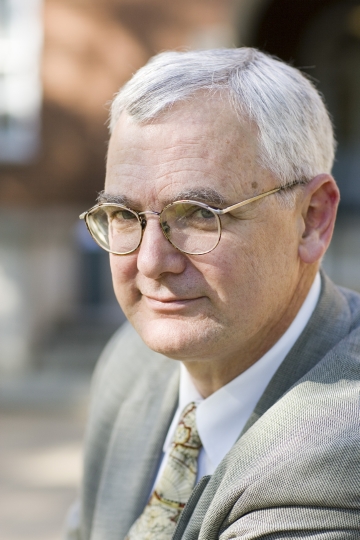Russia’s currency has taken a beating this week, at one point falling to nearly 75 rubles to the U.S. dollar. The Wall Street Journal says the ruble steadied to around 61 to the dollar Thursday after President Vladimir Putin tried to reassure the country in his annual year-end address.
Experts say the economic crisis is caused, in part, by Western sanctions linked to Moscow’s incursion into Ukraine and by falling oil prices.
Russia expert Allen C. Lynch, a University of Virginia professor of politics, offers the following insights into the situation.
Q. Is the economic crisis putting President Putin at risk politically?
A. Putin’s power is not in question for the immediate future. What is in question in the medium-term future is the basic economic and political model that Putin has constructed, i.e., a petro state fueling a quasi-authoritarian political machine that has not reformed the petro-fuels model of the Russian political economy in the 15 years that Putin has been in power.
Q. What does Putin need to do to bring the economy around?
A. The collapse of oil in 2014 from $115 a barrel to now less than $60 a barrel, reinforced by a so far 50 percent decline in the ruble for 2014, implies a much more challenging political environment for Putin, as he will now – if this crisis lasts long, which I think it will – have to make difficult choices among central pillars of his regime: A, the military; B, the energy sector; and C, society, which has become accustomed to rising incomes and more reliable social security under Putin.
What matters is the length of this crisis. If it passes in six months, Putin can survive without making changes (the state still has some $430 billion in reserves in its coffers). But if it lasts longer than a year or so, the Putin model as we have known it can no longer be sustained.
In the short-term, nationalist mobilization can reinforce Putin’s positions (his popularity is still in the mid-70 percent range, of course with controlled media).
Q. Why is the ruble in such trouble?
A. The bulk of Russia’s economic problems are independent of Western sanctions. The Russian economy had declined to virtually zero-percent growth before the Ukrainian crisis began in very late 2013. Sanctions have hit Russian firms’ access to refinancing (some $650 billion in private debt in the West), but the most important impact has come from the decline in oil prices, which has to do with Saudi-U.S. economic issues (i.e., Saudi concern about U.S. shale oil and gas production) but which has exposed Russia’s major vulnerability to volatile energy prices.
There has been no true structural reform of the Russian economy throughout Putin’s tenure. Fuels account for 25 percent of Russian GDP directly and 50 percent of state budget revenues. Almost half of each comes from export revenues.
Q. Part of the economic turmoil stems from Western sanctions imposed because of Russia’s invasion of Ukraine. Do you see Russia withdrawing to ease those sanctions?
A. I am skeptical about a real compromise on Ukraine. For Putin, Ukraine transcends economics and security. It’s about Russian identity. Any stable solution must involve two elements: Russia must show convincingly that it respects the implications of Ukrainian sovereignty, and Europe and the United States must assure Russia that Ukraine can never be a member of NATO and that Ukraine’s move toward the EU will not damage Russia’s economic interests.
The problem is that even if the West were able to provide such assurances, Putin would not believe them, after the history of Russian-NATO relations over the past 17 years. Keep in mind that Russia still has access to European energy markets. It’s the denial of access to financial markets that matters in the sanctions.
Q. What are Russia’s options for ending the economic crisis?
A. If Russia cannot find a solution to the Ukraine crisis that the West agrees to, it has no good options. It clearly has no Western option for the foreseeable future. Russia will never agree to become a vassal of China, which is the alternative to Westernization; in that case, Russia will sink into a quiet oblivion as a vast Eurasia ghetto, with allies like South Ossetia, Abkhazia, Trans-dnistria and Armenia – to which we can add a vast “Cuba” on its western borderlands, in the form of Ukraine. Ironically, Putin may turn out to be the greatest state-builder in Ukrainian history.
Lynch is former director of U.Va.’s Center for Russian, East European and Eurasian Studies (1993-2008), former assistant director of the W. Averell Harriman Institute for Advanced Study of the Soviet Union at Columbia University and the author of several books, including “Vladimir Putin and Russian Statecraft” (2011) and “How Russia Is Not Ruled: Reflections on Russian Political Development” (2005).
Media Contact
Article Information
December 18, 2014
/content/what-can-russia-do-save-ruble-russia-expert-allen-c-lynch-has-some-answers

